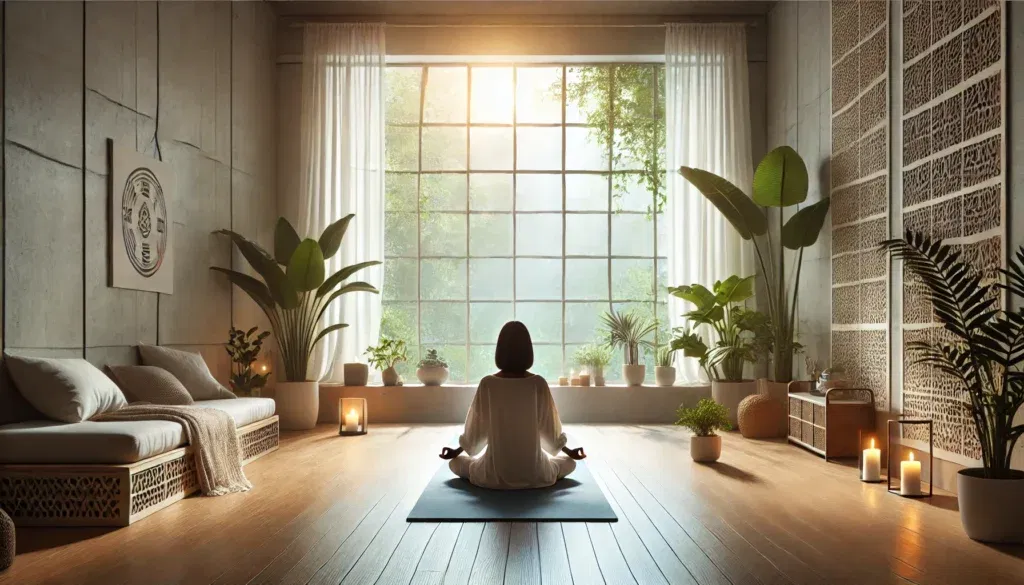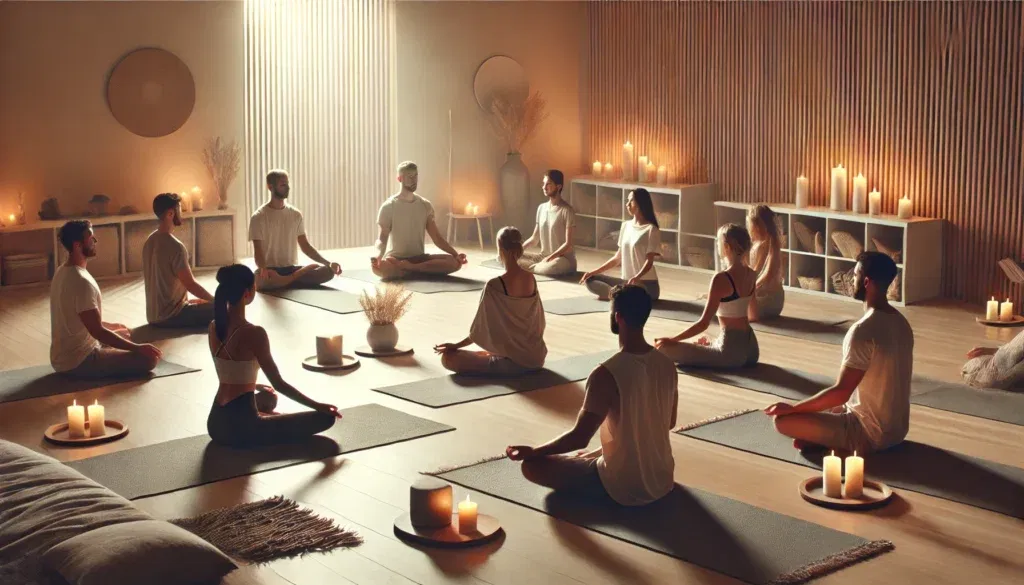Introduction: Understanding the Power of Meditation
Meditation has been practiced for centuries, providing individuals with a profound method for achieving mental clarity, emotional balance, and spiritual growth. As modern life becomes increasingly hectic, many people are searching for the best way to learn meditation and integrate it into their daily routines. For beginners, meditation can seem daunting, yet with the right guidance, anyone can develop a meaningful practice. Understanding how to meditate properly is essential to gaining its full benefits, from reducing stress to enhancing cognitive function. This guide explores the fundamental principles of meditation for beginners and provides practical insights on how to start meditation effectively.
You may also like: The Science Behind Meditation: How It Transforms Mental and Physical Health
The Science Behind Meditation and Its Benefits
Scientific research has validated the immense benefits of meditation, demonstrating its positive impact on mental and physical health. Studies have shown that meditation reduces cortisol levels, the hormone responsible for stress, while simultaneously increasing dopamine and serotonin, which are associated with feelings of happiness and well-being. Learning how to meditate properly involves engaging in techniques that promote mindfulness, deep relaxation, and enhanced self-awareness. The best meditation for beginners includes structured breathing exercises, guided imagery, and mindfulness techniques that help cultivate mental clarity and emotional stability.
How to Begin Meditation: Setting Up Your Practice
Starting a meditation practice requires a conducive environment, a comfortable posture, and an open mindset. One of the best ways to learn meditation is to create a dedicated space that is quiet and free of distractions. Beginners should choose a comfortable seating position, whether sitting cross-legged on the floor or on a chair with proper back support. Understanding how to start meditation also involves selecting the right type of practice, such as mindfulness meditation, breath-focused meditation, or guided meditation for beginners. Setting an intention before each session helps create a deeper connection to the practice and enhances focus.
Choosing the Right Meditation Techniques
Various meditation techniques cater to different preferences and goals, making it important to explore what works best for each individual. Mindfulness meditation for beginners involves observing thoughts and emotions without judgment, cultivating a sense of presence and awareness. For those wondering how to get into meditation, breathing exercises such as diaphragmatic breathing or alternate nostril breathing can help anchor attention and promote relaxation. Guided meditation for beginners is another effective approach, providing structured narration that leads individuals through visualization and relaxation techniques. Understanding where to learn meditation and experimenting with different techniques ensures a fulfilling practice.

Overcoming Common Challenges in Meditation
Many beginners struggle with restlessness, distractions, and difficulty focusing during meditation. The best way to start meditation is to approach it with patience and consistency. One of the most common concerns is how long to meditate for beginners; starting with five to ten minutes per session and gradually increasing the duration allows for a sustainable practice. Practitioners may also wonder how to get better at meditation, which involves regular practice, self-compassion, and adjusting techniques based on personal needs. Developing mindfulness throughout the day, beyond formal meditation sessions, also enhances long-term benefits.
The Role of Guided Meditation for Beginners
Guided meditation is an excellent entry point for those new to the practice, offering structured guidance that helps maintain focus and relaxation. Audio or video sessions led by experienced meditation instructors provide step-by-step instructions, eliminating uncertainty for beginners. Online platforms and meditation apps offer accessible options for those wondering where to learn meditation or how to get started with meditation effectively. Incorporating guided sessions into daily routines can help individuals ease into the practice and build a strong foundation.
How to Start a Meditation Practice: Building Consistency
Establishing a consistent meditation routine is crucial for reaping its long-term benefits. The best way to learn meditation involves integrating it into daily life, whether practicing in the morning to set a positive tone for the day or before bed to unwind. Using meditation reminders, joining a meditation community, or keeping a journal to track progress can enhance motivation. For those seeking an introduction to meditation, structured programs provide step-by-step approaches to developing a sustainable habit. Recognizing that meditation is a journey rather than a destination allows individuals to embrace their progress without pressure.

Frequently Asked Questions (FAQ): How to Begin and Improve Your Meditation Practice
1. What is the best way to learn meditation as a beginner? The best way to learn meditation is by starting with simple and structured techniques that allow for gradual progress. Guided meditation for beginners can be particularly helpful, as it provides clear instructions and helps ease into the practice without confusion. Many people find mindfulness meditation for beginners to be an effective approach, as it teaches awareness of breath, body sensations, and thoughts. Utilizing online meditation tutorials, mobile apps, or local meditation groups can offer support and structure. Exploring different styles and techniques is key to finding the best meditation for beginners that aligns with your personal needs and preferences.
2. How can I start meditation if I have a busy schedule? One of the best ways to start meditation with a hectic schedule is by integrating short sessions into daily routines. Practicing even five minutes of mindfulness meditation for beginners in the morning or before bed can create a habit without feeling overwhelming. Using apps that offer quick and easy meditation exercises can help maintain consistency. Another approach is practicing active meditation, such as mindful walking or deep breathing during commutes. The key to how to get into meditation is making it accessible and adaptable to your lifestyle rather than a time-consuming obligation.
3. What is the proper way to meditate for beginners? The proper way to meditate involves finding a quiet space, maintaining a comfortable posture, and focusing on your breath or a guided instruction. Many beginners struggle with distractions, but the best way to learn meditation is to gently redirect focus without judgment. Using a meditation tutorial can offer structured guidance on how to start a meditation practice correctly. Engaging in mindfulness techniques, such as scanning bodily sensations or repeating a mantra, helps deepen concentration. Developing patience is crucial when learning how to meditate properly, as progress often comes with consistent and non-judgmental practice.
4. Where can I learn to meditate effectively? There are numerous resources available for those wondering where to learn meditation, including online courses, local meditation centers, and mobile apps. Many online platforms provide comprehensive introductions to meditation, covering everything from basic techniques to advanced mindfulness practices. Attending meditation retreats or workshops can also provide hands-on guidance from experienced practitioners. If accessibility is a concern, finding the best online meditation resources that cater to various experience levels can be beneficial. Whether through in-person sessions or digital tools, learning how to start meditation requires consistency and an open mindset.
5. How long should beginners meditate to see benefits? When considering how long to meditate for beginners, experts suggest starting with short sessions of 5 to 10 minutes. As comfort with meditation grows, gradually increasing session length to 20 minutes or more can deepen its effects. Consistency matters more than duration—practicing meditation daily, even briefly, builds mental clarity and emotional resilience. The best meditation for beginners is one that fits seamlessly into their routine without feeling like an added burden. Over time, regular meditation strengthens focus, reduces stress, and enhances overall well-being.
6. What are some common mistakes beginners make when learning how to meditate? One common mistake in meditation for beginners is expecting immediate results, which can lead to frustration. Another is assuming that meditation requires completely clearing the mind—when in reality, the goal is to observe thoughts without attachment. Beginners often struggle with discomfort due to improper posture; using cushions or chairs can help maintain relaxation. Not following a structured meditation tutorial can lead to inconsistency, making it harder to develop a routine. Understanding that meditation is a skill that improves over time can help those new to the practice remain patient and committed.
7. How can I get better at meditation over time? To improve meditation skills, beginners should explore different techniques and practice consistently. The best way to start meditation and enhance it over time is by incorporating breathing exercises, body awareness, and guided meditations. Journaling after meditation sessions can help track progress and identify challenges that need addressing. Engaging with a meditation community or instructor provides additional insights and motivation. As focus improves, extending session durations and experimenting with advanced mindfulness techniques can deepen the experience.
8. What type of meditation is best for absolute beginners? The best meditation for beginners is often mindfulness meditation, as it involves simple techniques like focusing on the breath and observing thoughts without judgment. Guided meditation for beginners also helps ease into the practice by providing structured support. Loving-kindness meditation can be effective for those seeking emotional healing, while body scan meditation is useful for relaxation. The best way to learn meditation is by trying different styles and seeing what resonates most with individual needs. Over time, preferences may evolve, allowing for deeper exploration into meditation practices.
9. How do I stay motivated when starting a meditation practice? Staying motivated when learning how to start a meditation practice requires setting realistic goals and maintaining a sense of curiosity. Joining online meditation groups or using meditation apps can create a sense of accountability. Tracking progress, such as noting improvements in stress levels or focus, reinforces the benefits of meditation. Making meditation a rewarding experience, rather than a rigid task, helps in sustaining long-term engagement. Understanding that even brief sessions contribute to overall well-being ensures motivation remains strong despite busy schedules.
10. Can guided meditation help beginners establish a consistent practice? Yes, guided meditation for beginners provides structure and clarity, making it easier to establish a routine. Many meditation tutorials offer step-by-step instructions, allowing beginners to understand different techniques without feeling lost. Listening to guided sessions on how to start meditation eliminates the pressure of figuring it out alone. Consistency becomes easier when following well-designed programs that gradually introduce more advanced techniques. As individuals become comfortable with guided meditation, they can transition into self-guided practices for deeper exploration.

Conclusion: Embracing the Meditation Journey
Meditation is a transformative practice that offers profound mental, emotional, and physical benefits. Learning how to meditate properly requires patience, experimentation, and a commitment to self-care. The best meditation for beginners includes accessible techniques such as mindfulness, breathing exercises, and guided sessions that facilitate relaxation and self-awareness. Understanding how to start a meditation practice and overcoming common challenges paves the way for a fulfilling and sustainable journey. As individuals explore various meditation approaches, they cultivate inner peace, resilience, and a deeper connection with themselves and the present moment.
mindfulness techniques, stress reduction practices, guided relaxation exercises, meditation breathing methods, emotional well-being, self-awareness training, stress relief meditation, meditation consistency tips, best relaxation techniques, holistic wellness, meditation for focus, morning meditation habits, daily mindfulness routines, breathwork for beginners, digital meditation resources, meditation habit formation, deep relaxation techniques, mindfulness for anxiety relief, mental clarity enhancement, meditation for personal growth
Further Reading:
How to Start a Meditation Practice: A Guide for Beginners
Disclaimer
The content provided by HealthXWire is for informational purposes only and should not be construed as medical advice, diagnosis, or treatment. While we strive for accuracy, the information presented on this site may not reflect the most current research or medical guidelines. Always seek the advice of your physician or other qualified health provider with any questions you may have regarding a medical condition. HealthXWire does not endorse, recommend, or guarantee the efficacy of any products, services, or treatments mentioned on this site. Users should not disregard professional medical advice or delay seeking it because of something they have read on HealthXWire. HealthXWire is not liable for any damages, loss, or injury arising from reliance on the information provided herein.



